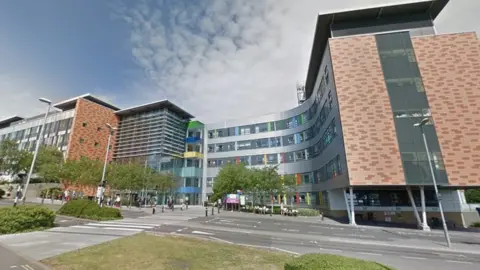Warning over pressures on Portsmouth's Queen Alexandra Hospital
 Google
GooglePatient demand at Portsmouth's Queen Alexandra Hospital is "outstripping capacity", hospital bosses have warned.
Medical director Dr John Knighton told city councillors bed occupancy was above 99% and elective care would be "inevitably compromised".
It comes despite falling numbers of Covid-19 patients at the hospital.
The government has said pressure on the NHS is the main factor that would determine future Covid restrictions in England.
At a meeting of Portsmouth City Council's Health Overview and Scrutiny Panel, Dr Knighton said the pressure on the hospital was "unusual and rather extreme", according to the Local Democracy Reporting Service.
'Prioritise cancer care'
"We've seen attendances at our emergency department - both walk-ins and ambulance conveyances - rise steadily since April and continue to rise."
He said the occupancy rates were at "an unheard of level, even for the depths of winter".
"We will continue to prioritise cancer care no matter what and we will be doing everything we can do to minimise the effect on elective, planned work but there may come a point at which that is inevitably compromised," the doctor added.
He said this had given hospital staff less of an opportunity to recuperate ahead of the winter period, although initiatives, including an extra day of leave, had been brought in.
Sixty-three Covid-19 patients were currently being treated, compared to a post-reopening high of 83 three weeks ago.
Dr Knighton said booster vaccination doses are also now being given to its workforce of which more than 93% has received two doses of one of the Covid-19 vaccines.
Earlier this month the government announced the NHS in England would get an extra £5.4bn over the next six months to respond to Covid-19 and tackle the backlog caused by the pandemic

Follow BBC South on Facebook, Twitter, or Instagram. Send your story ideas to [email protected].
